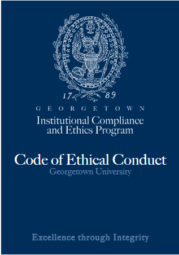Higher Education Act and Other Disclosures
Consumer Information for Prospective and Current Georgetown University Students (HEOA Disclosures and Student Right to Know Act Disclosures)
To help prospective and current students locate important information about the University, this webpage collects links to helpful information on a variety of subjects, including the University’s academic programs, cost of attendance, financial aid, and post-graduate activities of the University’s graduates. Georgetown’s presentation of this information complies with the Higher Education Act, as amended, and its implementing regulations.
If you have questions or would like copies of any of the information presented here, please email the Office of Compliance and Ethics at compliance@georgetown.edu or call 202-687-6493.
Notice of Availability of Institutional and Financial Aid Information
- Federal Student Aid
- Financial Aid and Contact Information
- Financing Study Abroad
- Refund Policy and Requirements for Withdrawal and Return of Federal Financial Aid
- Satisfactory Academic Progress
- Notice to All Students on Drug Use and Ineligibility for Federal Financial Aid
- Financial Aid Calculator
General Institutional Information
- Academic Calendars
- Academic Programs and Requirements
- Admissions
- Campus Maps
- Grading Policies (Also review information for particular academic programs)
- Privacy of Student Records-Family Educational Rights and Privacy Act (FERPA)
- Facilities and Services for Students with Disabilities
- Student Diversity
- Diversity – Main Campus Undergraduate Students (see CDS-B tab at linked page and also Common Data Set reports)
- Diversity – Main Campus Students
- Diversity – Georgetown Law Center Students
- Diversity – School of Medicine Students
- Cost of Attendance (Office of Student Financial Services)
- Textbook Information – In compliance with 20 U.S.C Sec. 1015b, Georgetown provides students with ISBN numbers and pricing information for required texts in its course schedule system, provides this information to the University’s bookstore, and encourages students to explore used book, book rental and buyback programs, and other ways to minimize the cost of required texts.
- Transfer of Credit Policies and Articulation Agreements
- Accreditation, Approval, and Licensure of Institution and Programs
- Accreditation
- Georgetown University is accredited by the Commission on Higher Education of the Middle States Association of Colleges and Schools, 3624 Market Street, Philadelphia PA 19104, 215-662-5606. The University’s Middle States Statement of Accreditation is available on the Middle States website. University Schools and programs are also accredited by the following organizations: The American Association of Nurse Anesthetists (AANA) ; The American Bar Association (ABA); The Accreditation Commission for Midwifery Education (ACME); The Commission on Collegiate Nursing Education (CCNE); and The Liaison Committee on Medical Education (LCME) of the American Medical Association and the Association of American Medical Colleges.
- Copyright Infringement-Policies and Sanctions; Computer Use and File Sharing
- Student Activities
- Career and Job Placement
- Information regarding post-graduate employment obtained by and further graduate studies pursued by Georgetown undergraduate students is found in the Office of Career Services’ Outcome Reports.
- Graduates of the Graduate School of Arts & Sciences’ Master’s Degree Programs obtain employment in government agencies, private non-profit organizations, and corporate and other environments. Some graduates also pursue studies in professional degree and Ph.D. programs.
- Graduates of the Graduate School of Arts & Sciences’ Ph.D Programs obtain employment in tenure and non-tenure track faculty positions at colleges and universities across the nation and the world. Some graduates also obtain employment in government agencies, private non-profit organizations, and corporate and other environments.
- Georgetown University Law Center graduates. The Law Center’s Office of Career Services supports students in obtaining legal employment with law firms, government, non-profit organizations and corporate and other entities.
- Georgetown University School of Medicine students participate in the National Residency Matching Program or other residency matching programs (e.g., the Military Match or other sub-specialty matching programs) or opt to do research following graduation. Ninety-nine to one hundred percent of GUSOM graduates who participate in the match or the subsequent scramble process are placed in residency programs. Information about the residency programs into which School of Medicine graduates have matched.
- Georgetown University School of Nursing and Health Studies Programs – Graduates of School of Nursing and Health Studies Programs find employment in the variety of nursing fields for which they are trained. Based on surveys and information received from former students, SNHS graduates are employed in hospitals, urgent care facilities, emergency care facilities, surgical care centers, physician practices, community based and retail clinics, Federally Qualified Health Centers (FQHC), and other health care facilities. In addition to nursing and related roles, they go on to advanced study, and become staff development instructors, patient educators, clinical instructors and clinical faculty.
- McDonough School of Business students find post-graduate employment in a variety of business, finance, government, non-profit and other roles and are supported by the MBA Career Center and other career resources.
- McCourt School of Public Policy students find post-graduate employment in policy-related and other roles in the public, private and non-profit sectors.
- Withdrawal Policies
- Main Campus
- Law Center (see Section 4 of Law Student Handbook)
- School of Medicine
Student Financial Assistance
- General Assistance Information
- Federal Student Financial Aid Penalties for Drug Violations – Drug convictions no longer affect eligibility for student aid. Information about the effect of criminal convictions on eligibility for federal student aid is available on the Federal Student Aid website.
- Student Loan Information
Health and Safety
- Drug and Alcohol Abuse Prevention Resources
- Vaccination Policies
- Campus Crime Statistics and Clery Compliance
- Fire and Life Safety Program, Fire Statistics and Fire Log (On-Campus Housing Facilities)
Student Outcomes and Demographics
- IPEDS Data Feedback Reports (including Student Right-to-Know Act information — Retention, Completion and Graduation Rates, and Transfer-Out Rates).
- Graduation Rates for Students Receiving Athletically Related Student Aid (Student Right-to-Know Act); Transfer-out Rates for Students Receiving Athletically Related Student Aid (Student Right-to-Know Act)
Intercollegiate Athletic Program Participation Rates and Financial Support Data (Equity in Athletics Disclosure Act)
Voter Registration
- Georgetown University students can now find a “Register to Vote/Request Your Absentee Ballot” button under the Personal Information page on GU Experience. This voter portal is a one-stop shop for students interested in exercising their right to vote, and its integration into GU Experience will connect even more Georgetown students with the resources they need as we aim to reach the goal of 100% eligible student voter registration. Developed in partnership with the Andrew Goodman Foundation, this resource will allow students to register to vote from their home state or DC, request an absentee ballot, sign up for election updates, check their registration status, and learn more about the candidates. Information about voter registration in the local area is also available as follows:
- District of Columbia
- Maryland
- Virginia
Code of Ethical Conduct


